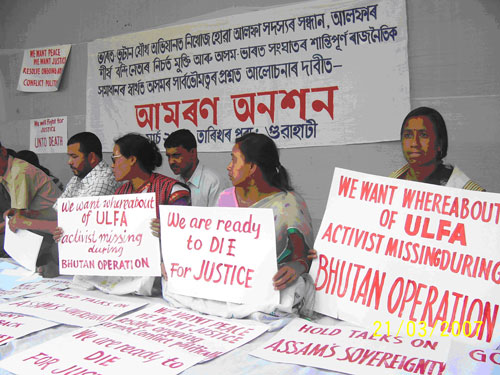by Manab Adhikar Sangram Samiti (MASS)

On March 21, 2007 five women decided to begin an indefinite hunger strike in Assam. Their names are: Gyanoma Moran (alias Shyamoli Gogoi and wife of Prakash Gogoi), Menoka Chetia (alias Meenakhi Borbora and wife of Naba Changmai); Padumi Timung (alias Juri Neog and wife of Robin Neog); Kabita Chakrabarty (wife of Nilu Chakrabarty); Anima Devi (wife of Bening Rabha) and Malini Ingtipi (alias Hema Hansipi and wife of Asanta Baghphukon). Their pseudonyms and the names of their husbands are important to note. So are the reasons why they have gone on hunger strike. The pseudonyms of the women are their organizational names that they were known by, when they joined the United Liberation Front of Assam (ULFA). Their husbands, all ULFA activists, had gone missing after the Royal Bhutan Army (RBA) – aided by the Indian Army – attacked camps belonging to ULFA, National Democratic Front of Boroland (NDFB) and Kamatapur Liberation Organisation (KLO) in December 2003 in what they called Operation All Clear. The attacks were widely publicised in the regional media and the ferocity and lack of transparency of the terms of combat prompted several national and international organisations including the Red Cross to plead for access to the victims. Such pleas went unheeded by the RBA, who claimed that those who were arrested/detained in the course of combat, were handed over to the Indian administration.
Ever since, the women and their comrades who were handed over to the authorities in India, have been trying to find out what has become of their spouses and friends who have not been traced as yet. They moved the court for answers and consequently the Gauhati High Court ruled that the government should clearly state what had happened to the persons who were detained and subsequently handed over to the Indian administration. The government of India has resolutely refused to comply with the court’s order stating that such a disclosure would tantamount to compromising the security of the country.
It is this imperious attitude of the government that has led to these women resorting to the only available method of protest left open for them. Their questions hit at the heart of a nation that does not care about the rule of law, let alone secure the rights of the poor and oppressed. If indeed the government of India is serious about solving the problems that beset Assam and its people, surely the best way to demonstrate such intentions would be to find an ethical solution to the armed conflict by adhering to the basic norms of international law. Instead, there is a callous and heartless effort to criminalise the protest.
In a memorandum addressed to the President of India – just before they embarked on the hunger strike – the six activists pointed out what prompted them to take the extreme step of their “fast unto death”. They were protesting against the custodial disappearances of their husbands and others following the infamous ‘Operation All-Clear’ in December 2003. They demanded a peaceful resolution to the Indo-Assam conflict that has besieged the peoples of the state for more than two decades. They also demanded the unconditional release of the ULFA leaders in jail, which remains a key to ensuring a just resolution to the impasse in the possibility of talks between the government of India and the armed opposition group. These three demands are not extraordinary in their articulation. They simply reiterate the basic tenets of democracy and justice in the quest for a peaceful resolution to armed conflict. Yet they are profoundly political and reminiscent of the demands made by Irish Republican prisoners who went on a hunger strike in Belfast in the early 1980s. The protesting women are demanding answers from India’s political classes who tend to forget that their celebrated democracy does not extend to the people of Assam, Nagaland, Manipur, Tripura and other states of the so-called Northeast.
The response of the government has been utterly predictable. After trying to appease the women with false promises, they have unleashed the might of the police upon them. In the early hours of March 31, 2007; police personnel forcibly entered the venue of the protest and dragged the protestors to hospital where they were fed intravenously against their will. In what must sound like a typical case of hypocrisy and moral ineptitude, the police and government spokespersons have gone on record to state that the women would not be allowed to die in this manner. Instead of addressing their grievances, they have been treated as though they were criminals and clinically disturbed persons in need of governmental discipline. The administration no longer feels that it is important to find the political will to ensure transparency in their secret war against democratic principles and justice. Instead, with the collusion of the powerful security apparatus, they expect the protest to “go quietly into the night”.
For those exhorting the six women to end their hunger-strike in the interest of peace, there is but one question. Is peace the desolation that these women feel after successive operations of brutal and oppressive power upon them? If indeed it is so, then these protests will not go quietly. They will rage against the injustice until answers are forthcoming.
We urge all democratic sections of society to extend their solidarity to the hunger-strikers and demand:
(a) They be released from detention forthwith;
(b) Their demands be addressed by the highest bodies of the Indian government, including the security apparatus;
(c) That the government make a genuine effort to engage ULFA in peace talks;
(d) That a political resolution to the armed conflicts in the region be taken as the only means of resolution of the same.
Central Office, Manab Adhikar Sangram Samiti (MASS)